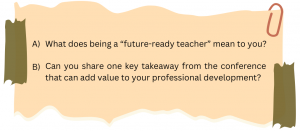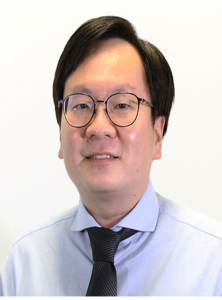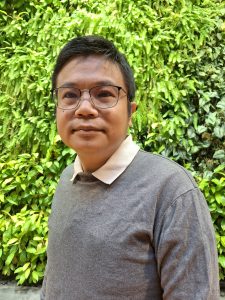Young Children’s Voices in Mathematical Problem Solving
Contributed by Dr Ho Siew Yin and Sng Wei Qin Abbie, from NTUC First Campus, for SingTeach Virtual […]
Read More
The role of a teacher extends well beyond the transmission of knowledge, encompassing the development of students’ critical thinking and emotional growth. Today, teachers also need to possess future-ready skills, and actively embrace technology, innovative teaching strategies and continuous professional development. Three teacher–participants from the Redesigning Pedagogy International Conference 2024 share their insights on being a future-ready teacher as well as key takeaways from the conference.


A) I believe that a future-ready teacher is one who shapes the holistic character and moral development of students, designs and facilitates learning experiences by co-constructing students’ knowledge in content, pedagogy and technology, and continues to reflect and grow in the teaching profession as a lifelong and adaptive learner. Future-ready teachers should also focus on fostering emerging 21st century competencies (e-21CCs) in our students as they are essential for success in our rapidly changing world.
B) The RPIC allows me to be updated with the emerging research, trends and best practices in education. It was a valuable opportunity for professional development and leadership growth to broaden my perspective and drive positive change in school. I appreciated the insightful sharing on the key components of metacognition (metacognitive knowledge, experiences and skills) from one of the symposium sessions. In terms of classroom implementation, metacognition may not be explicitly addressed in terms of our current practices. As metacognition is a key competency of future learners, I will read up more and share with fellow colleagues about the various metacognitive instructional approaches and strategies that enable our students to think, learn and self-regulate.

A) A future-ready teacher is one who can envision the future beyond his worldview. The different parts of the world at different developing stages allow some countries to take reference and envision what the future will be. More advanced countries will continue to take the lead in creating a “new” future. Singapore education has been looked upon by others based on measurable outcomes such as PISA and TIMSS. A future-ready teacher envisions and creates a future in his classroom. Be it transforming his classroom into a knowledge-creation community or an inclusive community, he plays an important role in creating the future of Singapore.
B) One key takeaway from the conference is how human competency can evolve with machine learning. The keynote speaker Professor Mutlu Cukurova reminded me of the responsible use of Artificial Intelligence (AI) so that I will not be over-reliant on AI, resulting in lowering my competencies while AI gains capabilities. The concept of confirmation bias in AI, where we tend to seek out, favour and interpret AI-generated outcomes that confirm what we think is right, is also intriguing. With actionable knowledge such as the PAIR framework to integrate AI into teaching and learning, this conference extends my worldview about the future I can create for my students in the classroom.

A) To me, being a “future-ready teacher” means staying abreast of technological advancements like AI that influence teaching and learning. It also means to role-model open-mindedness and embrace diverse perspectives during interactions with students. A future-ready teacher nurtures self-directedness through inquiry-based learning, encouraging students to explore and discover independently. This approach not only prepares students for future challenges but also develops their critical thinking and a lifelong love for learning.
B) One key takeaway for me is to continue experimenting with strategies to engage my students in the formative assessment and learning process. From the conference, I learnt how it is important to involve students metacognitively as that will eventually develop them into more independent learners. To do that, I need to adopt a process-oriented mindset that provides students the time and space to reflect and reattempt. It is through this empowering process that students can grow to be future-ready learners.
Subscribe to our newsletter to receive the latest information about our articles and events. Email us at sgteach@nie.edu.sg for assistance.
On topics related to teaching and learning, we invite you to contribute articles that focus on the following:
We welcome contributions that explore how educators are shaping the future of learning in a rapidly changing world marked by technological advancements and global challenges.
If you have a classroom or education research story to share, we invite you to send in your contribution articles.
Submit your contribution here:
SingTeach complies with the Personal Data Protection Act 2012 of Singapore
For questions, please contact the editorial team: sgteach@nie.edu.sg
